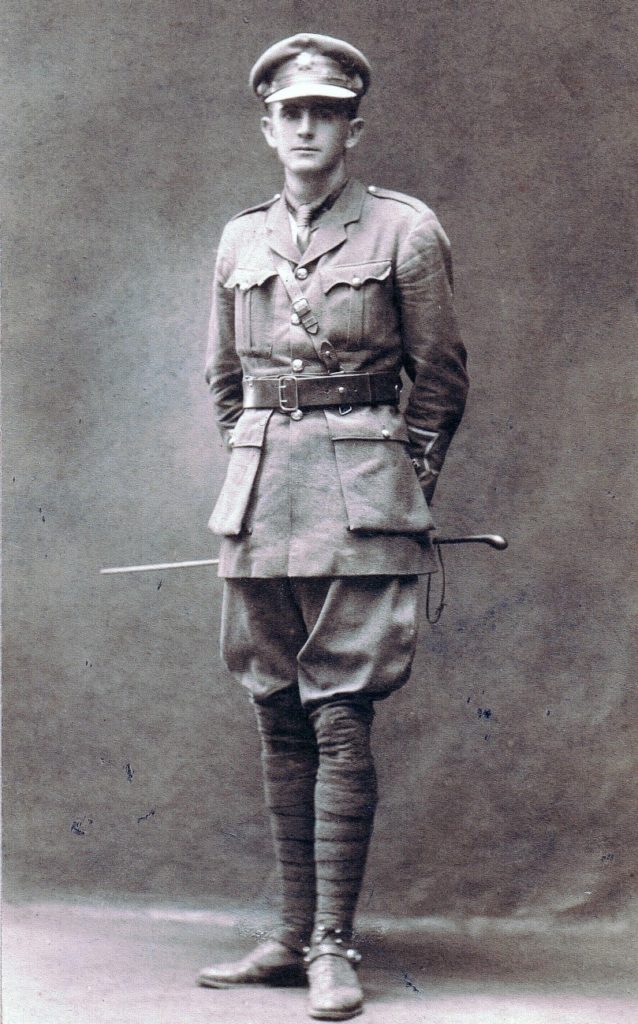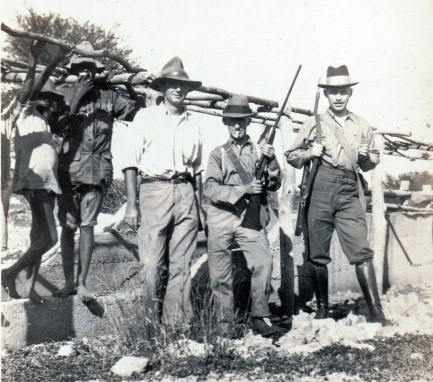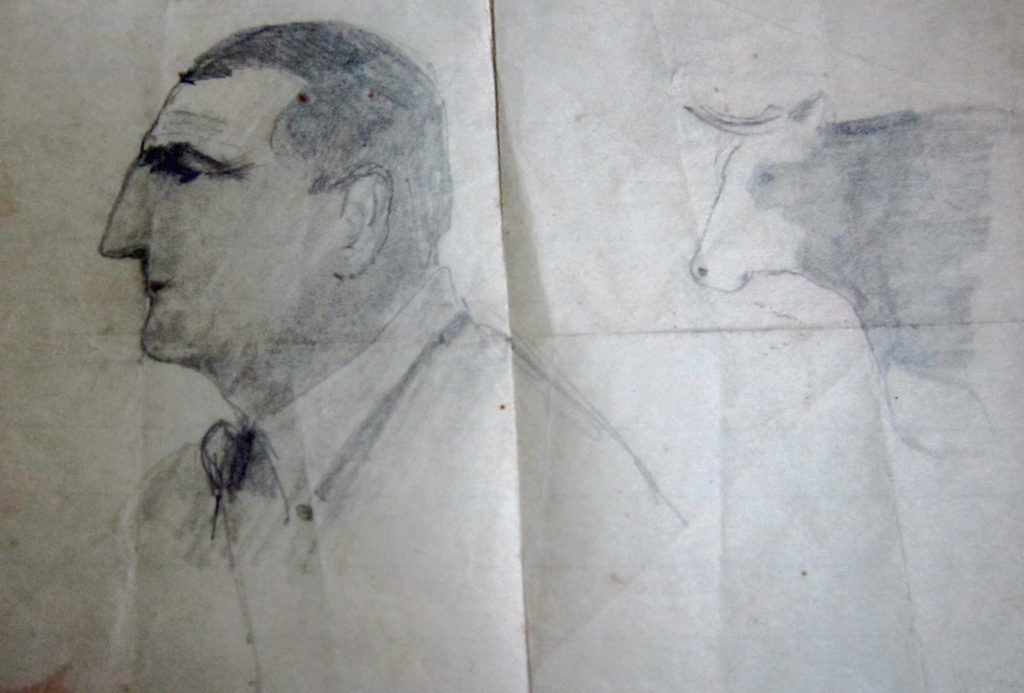Ramsay Daly was 51 years old when his first child, Jeanne, was born. Another Ramsay Daly, came next and he was 57 years old when Karine was born. This late reproduction could be explained by a genetic predisposition to move away. On the other hand, a number of crises may also have strengthened his family’s predisposition to migrate. William Daly came to South Africa in 1831 in what must have been a challenging sea voyage. William’s son, South Africa’s first Ramsay L’Amy, moved into the vast wild interior, to Potchefstroom, with his wife, Catharina Rocher. Here the family settled for a few years and here his son, Jean, and Jean’s son, the third Ramsay Daly, were born. But then the First Anglo Boer War precipitated economic crises that drove them further inland.
Ramsay’s father, Jean, moved to a little town, Nylstroom (now Modimolle), then went even further into the northern Limpopo region. Ramsay was sent to Wellington in the Cape for his Dutch Reformed education but this education was cut short by the outbreak of the Anglo Boer War (1899 – 1902). The men of his family all fought on the Boer side – many long years of hard guerrilla warfare. Ramsay was too young to fight. After the war it was thought that Ramsay could have a career as a clerk. A 1909 reference from Waterberg Lanbouwers Ko-operatiewe Vereeniging notes his skill with a typewriter and ranks him as “seer bruikbaar” (very useful). Ramsay had other ideas. He went to work on the goldmines but not as a miner.
Goldmining was changing. By the 1880s the goldmining industry was depressed: the reefs ran deep and the gold was trapped in pyritic ore. Then it was discovered that gold could be extracted from crushed ore by dissolving it in a cyanide solution. Ramsay took on the dangerous job of becoming a “cyanider”. Goldmining was, once again, a booming industry but now a vast labour force was needed and Ramsay also seems to have played a role in recruiting Black miners for this work.
While Ramsay was working on the mines,  the First World War started. He volunteered, first in German South West Africa, then in German East Africa. Finally In 1917 he enlisted for service in France. In all these war setting he suffered ill health and was repeatedly hospitalised with dysentery, possibly malaria and renal colic. At the end of the War his health, and his life changed. While waiting to be sent home, he served in Edinburgh with the Black Watch and gloried in being able to wear his first kilt. When he returned to London, as a lieutenant, he lived in the South African Officers’ Club, in Grosvenor Square. He was a beautiful man, tall and elegant. He took to the high life. He bought a coat and tails, patent leather shoes, and a dress shirt with a tucked front and tiny pearl buttons. Years later his face would light up as he told of being challenged to waltz with his partner up and down the main staircase in the Savoy Hotel.
the First World War started. He volunteered, first in German South West Africa, then in German East Africa. Finally In 1917 he enlisted for service in France. In all these war setting he suffered ill health and was repeatedly hospitalised with dysentery, possibly malaria and renal colic. At the end of the War his health, and his life changed. While waiting to be sent home, he served in Edinburgh with the Black Watch and gloried in being able to wear his first kilt. When he returned to London, as a lieutenant, he lived in the South African Officers’ Club, in Grosvenor Square. He was a beautiful man, tall and elegant. He took to the high life. He bought a coat and tails, patent leather shoes, and a dress shirt with a tucked front and tiny pearl buttons. Years later his face would light up as he told of being challenged to waltz with his partner up and down the main staircase in the Savoy Hotel.
In 1920, back in South Africa, he made a radical change. He packed his “glad rags’ in a suitcase, loaded up his motorcycle and kept moving North, past the farms of his father, until he reached the Limpopo River. Here he bought three large properties (Exeter, Dawidslust and Karreeboschdrift) and withdrew from society. He had a restless mind and explored the area. In a clay pot in a cave at the junction of the Mogalakwena and Limpopo Rivers he found rare beads from earlier settlements and donated them to the British Museum. He lived like a hermit, in a mud hut. He was an outsider. A well-off farmer, Hans Geerkens, came to his farm and found him soaping himself, standing under a shower connected to a raised water tank. He decided that this Ramsay was different and they became lifelong friends.
 The Bushveld may well have been a way for Ramsay to resolve the devastation of the war years. His first task was to fence, then stock the property and he earned this money hunting wildebeest and other game and selling skins and biltong in Potgietersrust, 200 km away. He carried on hunting. Like other farmers of his time, he saw game as competing with cattle for grazing, and putting stock at risk of transmitted diseases. Then he became more conservation-minded, introducing his own breed of Hereford cross cattle which had a brown patch around the eye making them less susceptible to eye diseases. He drew a sketch of himself and his beloved Hereford.
The Bushveld may well have been a way for Ramsay to resolve the devastation of the war years. His first task was to fence, then stock the property and he earned this money hunting wildebeest and other game and selling skins and biltong in Potgietersrust, 200 km away. He carried on hunting. Like other farmers of his time, he saw game as competing with cattle for grazing, and putting stock at risk of transmitted diseases. Then he became more conservation-minded, introducing his own breed of Hereford cross cattle which had a brown patch around the eye making them less susceptible to eye diseases. He drew a sketch of himself and his beloved Hereford.

His cattle farming paid dividends. Once a year his cattle were sent to market and he went along on his motorbike, unpacked his elegant clothes and socialised, briefly, with his very successful uncle’s family in Johannesburg, Oom, Dr Ramsay Daly.
Dr Daly recognised that Ramsay was suffering from a gastric ulcer. We now know that many soldiers who served in the two World Wars came home with gastric ulcers. Ramsay applied for a military pension for his problem but, in 1933, the Medical Board decided “that the Gastric Ulcer which he is suffering from is in no way connected with this Military Service.” The only recourse then was surgery and Dr Ramsay Daly was an expert in the best treatment then available, resection of the stomach. Ramsay underwent what we now think of as drastic surgery and he was left with a lifelong need of medication to reduce stomach acid.
Years later at a local dance he met Louise Hugo who had been sent to this area to fulfill her contract for teacher training. They were smitten. She was an elegant woman and he was a remarkably handsome man. He knew he could not ask her to share his mud hut so he built a house while living in a little tent where his feet stuck out of the tent opening. One morning there were lion tracks all around the tent but the lion had apparently been scared off by the mosquito net in which he was enveloped. They married when he was 48 years old and she was 27.
Ramsay was in his element in the Bushveld. He kept in touch with the wider world through newspapers. World War II meant a shortage of fuel and the once-a-week bus service to the store at Maasstroom was cancelled. Ramsay arranged that his week’s collection of The Johannesburg Star would be dropped from the mail plane flying from Johannesburg to Salisbury. He went out on horseback to retrieve his precious newspapers.
Ramsay was at first reluctant but eventually he was happy to welcome three little children into the family. But there lay the problem. His children needed to join the society he had eschewed; they needed to be educated and they had to learn to speak English. It broke his heart when the Bushveld farms were sold and the family moved back into the milieu of contemporary South Africa.
